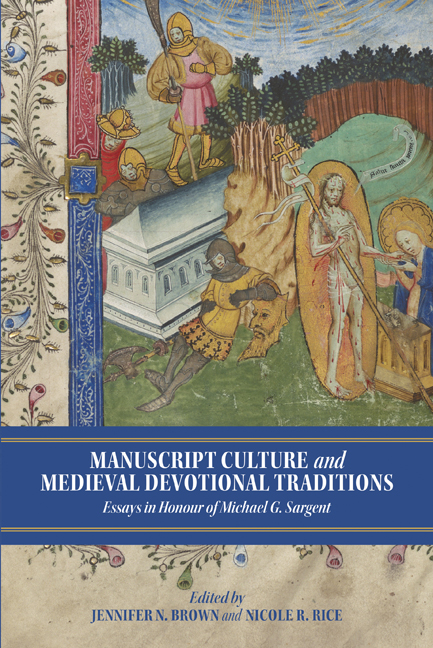Book contents
- Frontmatter
- Dedication
- Contntes
- List of Illustrations
- Acknowledgements
- List of Abbreviations
- Michael Sargent: An Appreciation
- I Manuscript Transmission and Textual Adaptation
- II Translated Texts and Devotional Implications
- III Rhetorical Strategies and Spiritual Transformations
- IV Texts and Contours of Religious Life
- Bibliography
- List of Contributors
- Michael G. Sargent’s Publications
- Index
- Tabula Gratulatoria
- York Manuscript and Early Print Studies
2 - Martyred Masons: The Legend of the Quattuor Coronati in Some Medieval English Contexts
Published online by Cambridge University Press: 24 March 2021
- Frontmatter
- Dedication
- Contntes
- List of Illustrations
- Acknowledgements
- List of Abbreviations
- Michael Sargent: An Appreciation
- I Manuscript Transmission and Textual Adaptation
- II Translated Texts and Devotional Implications
- III Rhetorical Strategies and Spiritual Transformations
- IV Texts and Contours of Religious Life
- Bibliography
- List of Contributors
- Michael G. Sargent’s Publications
- Index
- Tabula Gratulatoria
- York Manuscript and Early Print Studies
Summary
Among the more esoteric manifestations of late Victorian medievalism is the journal Ars Quatuor Coronatorum (‘Art of the Four Crowned Ones’), first appearing in 1888 and devoted to the antiquities and philosophy of Freemasonry. The subject of the present paper is not Freemasonry but the medieval legend and cult of the ‘Quattuor Coronati’ (henceforth Coronati), who were widely believed to be early Christian stonemasons and sculptors, martyred in Pannonia under Diocletian and named Claudius, Nicostratus, Simpronianus, Castorius and Simplicius (henceforth, Claudius et soc.). The topic is, admittedly, rather remote from Michael Sargent’s scholarly field of late medieval English devotional literature, but at least a substantial portion of the paper focuses on some little-known Middle English verses composed only a generation or so after the floruits of Walter Hilton and Nicholas Love. Embedded in a longer poetic tract, dated in the second quarter of the fifteenth century, the verses summarize the legend of the martyred masons, celebrating in particular their refusal either to fashion or worship a pagan ‘ymage’. If Hilton had lived long enough to encounter these verses, they might have piqued his interest.
The longer tract in which the Coronati verses occur is preserved in a pocketsized manuscript, British Library, MS Royal 17 A I, which students of Freemasonry usually refer to as the ‘Regius’ manuscript and which comprises the oldest known version of a set of statutes or customs known to modern Freemasons as the ‘Old Charges’. Although the Latin martyrdom narrative (henceforth Passio) of Claudius et soc. is well known in Masonic literature, the Middle English verse epitome of their story has attracted little attention, and my treatment of it below is very much a preliminary effort. The essay as a whole is divided into four parts: a brief introduction to and summary of the Passio (probably unfamiliar to most readers of this volume); some background on the longer Middle English poetic tract containing the verses on the Coronati legend; an old-fashioned ‘close reading’ of these verses in their contemporary fifteenth-century context; and an attempt to source them in relation to earlier epitomes, in the larger context of the medieval English reception of the Coronati legend and cult.
- Type
- Chapter
- Information
- Manuscript Culture and Medieval Devotional TraditionsEssays in Honour of Michael G. Sargent, pp. 25 - 47Publisher: Boydell & BrewerPrint publication year: 2021



